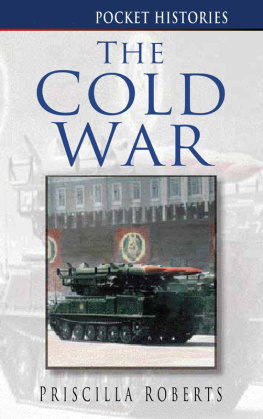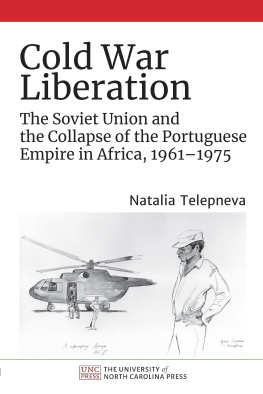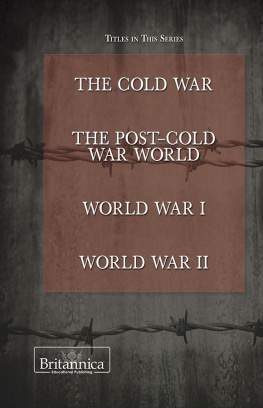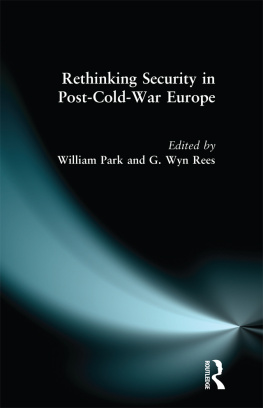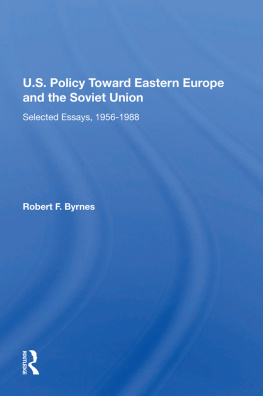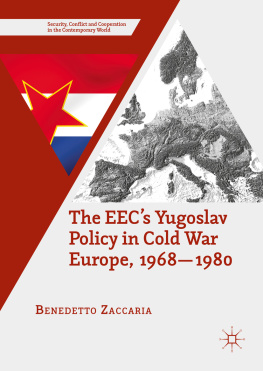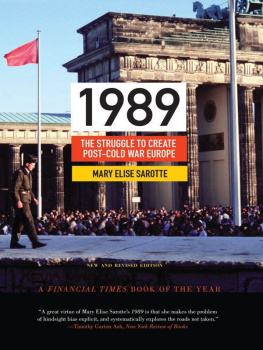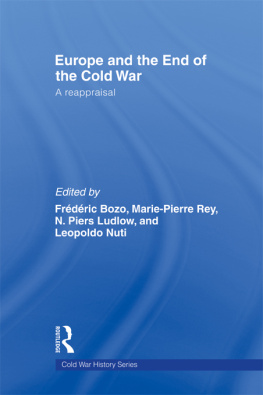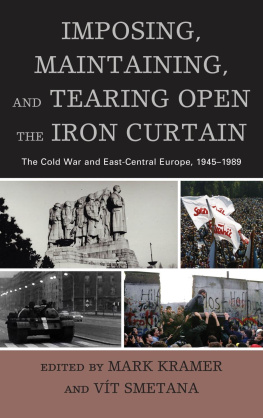First published 1992 by Westview Press
Published 2019 by Routledge
52 Vanderbilt Avenue, New York, NY 10017
2 Park Square, Milton Park, Abingdon, Oxon OX14 4RN
Routledge is an imprint of the Taylor & Francis Group, an informa business
Copyright 1992 Taylor & Francis
All rights reserved. No part of this book may be reprinted or reproduced or utilised in any form or by any electronic, mechanical, or other means, now known or hereafter invented, including photocopying and recording, or in any information storage or retrieval system, without permission in writing from the publishers.
Notice:
Product or corporate names may be trademarks or registered trademarks, and are used only for identification and explanation without intent to infringe.
Library of Congress Cataloging-in-Publication Data
Lynch, Allen, 1955
The cold war is overagain / Allen Lynch.
p.cm.
Includes bibliographical references and index.
1. United StatesForeign relationsSoviet Union.2. Soviet
UnionForeign relationsUnited States.3. World politics1945
4. Cold War.I. Title.
E183.8.S65L96 1992
327.73047dc20
91-45806
CIP
ISBN 13: 978-0-367-29091-7 (hbk)
When Nikita Khrushchev arrived home safely after his ouster from power in a Kremlin coup in October 1964, he reportedly tossed his briefcase on the sofa and told his wife, Nina Petrovna, that perhaps his greatest contribution to Soviet politics was that he had created conditions whereby the Soviet leader could now be removed from power by nonviolent means. Unlike Khrushchev, Mikhail Gorbachev was given a second chance: He survived the coup and lived to fight another day, owing in large measure to forces that his own policies, intentionally or not, had set in motion.
Why did the coup of August 1921, 1991actually the first even partly successful military coup in the 1,000-year history of the Russian statefail, whereas the palace coup orchestrated by Leonid Brezhnev and his colleagues against Khrushchev succeeded? The short answer is that this time the palace coup could not be contained within the confines of the palace. Unlike Khrushchev in 1964, Gorbachev was able to benefit from the existence of a politically emboldened society and a genuinely popular leader in Boris Yeltsin, who was able to mobilize those social forces so as to deprive the junta of its legitimacy to govern.
The immediate cause of the collapse of the coup was a split within the Soviet military. Simply put, many officers were unwilling to order ordinary conscript soldiers to fire on their civilian brethren, and some feared that such an order would be ignored. The coup leaders were overly confident in their ability to cow Soviet society with an awesome display of brute force and some lip service to social issues of concern to much of the population, such as housing and the price of food. It is clear that they did not anticipate having to confront the thousands of civilians who rallied to the defense of Boris Yeltsin and of constitutional government in Russia and the USSR. Under these circumstances, and with the recent example of the disintegration of the comparably multinational Yugoslav army as a warning, the military blinked.
This overconfidence on the part of the coup plotters seems directly related to the remarkable incompetence of the coup attempt itself. The junta, aside from not fully considering the need for a massive use of force against civilians (the attempted military coup in the Baltic states in January 1991 showed that Soviet peoples could no longer be intimidated by merely symbolic uses of force), committed the stupefying error of permitting the immensely popular Boris Yeltsin to remain at large. The juntas inability (or indecision?) to cut off immediately all communications from and to the USSR enabled Yeltsin to relay his rallying cry to the rest of Moscow and the USSR by means of foreign short-wave radio broadcasts back to the country, thereby leapfrogging the internal communications blockages that the junta did apply.
Apart from the Baltic states, the coup did not take significant root outside of Moscow. Furthermore, the coups truly active constituencyas distinct from the many fence-sittersseems to have been limited to a relatively few leading officials in the military, police, and military-industrial complex. It is interesting that Yegor Ligachev, long thought to be Gorbachevs arch-opponent, did not publicly associate himself with the coup. The execution of the coup thus reflected primarily the efforts of the reactionary, as opposed to the simply conservative, wing of the Communist Party.
The deeper cause of the coups collapse lies in the transformation of Soviet society that has been both the cause and consequence of the Gorbachev revolution. It must first be admitted that there is substantial ambivalence throughout Soviet society about the social consequences of economic reform. Fears of unemployment, inflation, and decreased social security are genuine and will have to be addressed by any government, reform or not. The coup leaders attempted to exploit these fears to give their doings a populist coloration. What they overlooked, to their ultimate dismay, was that in spite of this ambivalence and debate about the course of the future, there has also been a substantial consensus within the USSR and Russia about not returning to Stalinist ways. It is revealing in this respect that the junta studiously avoided all reference to Communist ideology and goals in their public declarations: Law and order, not a discredited communism, was their message. The inability of the junta to put forward any positive vision or program for the Soviet future prevented them from attracting significant popular support, or even from neutralizing opposition.
The significance of the defeat of the coup can hardly be exaggerated. Under the inspired leadership of Boris Yeltsin, the Russian people for the first time in their history were able to take responsibility for their political fate. In this respect the popular resistance of August 1991 may prove to be more important historically than the Russian Revolution itself: Whereas the Russian Revolution simply replaced an authoritarian system with a still more authoritarian order, the events of August 1991 open the prospect for genuine constitutional government in Russia and its neighbors within the former USSR.
Yeltsins role in defeating the coup also highlighted the changed nature of relationships between the central Soviet government and its constituent republics, and thus between Gorbachev himself and Yeltsin. Yeltsins actions affirmed the growing understanding between the republics and Gorbachev that in the future the republics would wield real sovereign power within the USSR. They had agreed even before August 19 that henceforth the republics would retain the exclusive right to levy taxes; the central Soviet government, that is, Gorbachevs government, would receive a fixed, limited percentage of revenues raised by the republics. The republics exclusive authority to levy taxes underscored the demise of the traditional, centralized Soviet system of government. The inability of the Soviet government to meet its payroll and other financial obligations on November 29,1991, and the subsequent assumption of union functions by the republics underscored the reality that, henceforth, sovereignty would reside in the republics and not in the union government. The establishment of the Commonwealth of Independent States by Russia, Ukraine, and Belorussia in Minsk on December 8, 1991, only gave juridical expression to this fact and formally ushered in the post-Soviet era that lies at the heart of the transformation of East-West relations that is the subject of this book.


